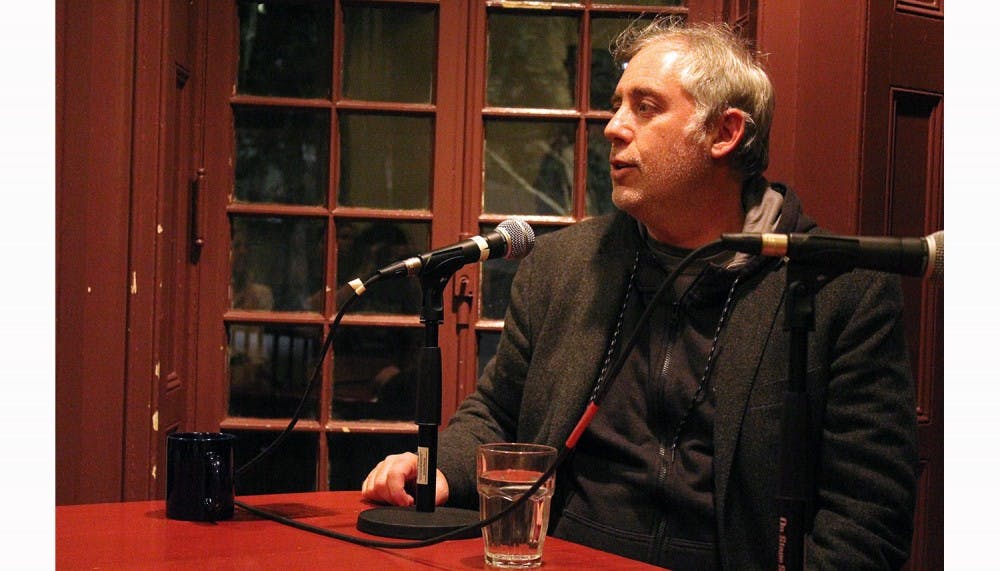It’s easy to get overwhelmed here. I can’t tell you how many times a day I hear the words and phrases: OCR, resume, LinkedIn, summer internship, what the hell do you want to do with your life, oh you’re a cinema studies major okay. Its equally easy to get caught up in it all, even to get dragged into courses and activities and plans you honestly don’t give a damn about. That’s why the best thing to happen to me this week was taking a step back from it all and experiencing something that hits close to home: hearing the inspiring story of Brian Koppelman, a screenwriter from my very own hometown.
Last Thursday, a middle–aged man sporting a black sweatshirt tucked beneath a gray sport jacket all atop a pair of blue jeans briskly walked into the Kelly Writers House. He sat down at a small table in the front of about a dozen rows of chairs, next to screenwriting professor Kathy De Marco Van Cleve. She introduced him, one accomplishment after the next: he runs a thriving podcast, a prolific Vine account, an active (and frequently politically charged) Twitter handle, and a popular blog–not to mention he is a revered screenwriter, with works ranging from feature films like Rounders to television series like Billions.
Before Van Cleve even finished introducing him and his many accolades, Koppelman affirmed, much to the surprise of the attendees and perhaps to the dismay of his screenwriting–professor–introducer: “all screenwriting books are bullshit.”
Personally, I was stunned. How could a screenwriter say such a thing? How could he say that to a group of students whose lifestyles are currently based on the academic study of their desired fields? How could he say that about Blake Snyder, David Mamet, and Syd Field, the script doctors and screenwriters who taught me so much and whose voices I hear in the back of my head whenever I write for the screen—or for anything quite frankly?
Van Cleve, responding to Koppelman’s bold claim, asserted, “I don’t like teaching by rules… I give them the deadlines.” However, that was exactly his point: there are no rules. Koppelman’s successful Vine series is called Six Second Screenwriting Tips, not Rules. He didn’t come to the Kelly Writers House with the intent to teach us how to write or how to polish a script; he believes that feedback “has no authority just because of its source.”
He even dared to utter that “there should not be such thing as a screenwriter.”
Disenchanted, I slumped in my chair. “If you wanna be successful in this industry," Koppelman started. Great, I thought to myself, another lecturer who only regurgitates the words that I hear, we all hear everyday: OCR, resume, LinkedIn, summer internship, and so on. “You’ve gotta be a fanatic, you’ve gotta be obsessed.” And with that, Brian Koppelman reminded me why I fell in love with movies in the first place.
“Until I was thirty years old, I was a blocked writer,” Koppelman said, beginning to walk us through the first act of this developing three act structure. Due to his “sense of perfectionism,” he was unable to accomplish his writing goals, with which perhaps many Penn students, like myself, struggle. I couldn’t help but begin to identify with our protagonist.
However, it was the “insatiable love and curiosity” for film that pushed him forward. He understood what he termed, “the grandeur of the movies,” of actually going to the movies and believing that you are always a different person when you walk out. You must have faith, Koppelman insisted, “that art can change you.” Our hero pushes on…
Until he hits a low point, and everything seems lost. “If you’re going to be in the arts in any way, you have to have an incredible tolerance for risk.” Rejection is simply part of it, Koppelman divulged. And, like for any riveting protagonist, its going to be hard to see that light at the end of the tunnel. “For me,” he adds, “the hardest part is to have the faith to do the work.”
But eventually, the second act breaks into the third, and we realize our hero is our hero for a reason. Koppelman revealed his formula for the story’s resolution: his success, “I meditate. I do morning pages. I take long walks.” He even “did stand up for a year and half,” simply because, “it was terrifying.”
“Doing a thing that scares you that much, you come out of it with a sense of yourself that’s different.” The character arc is complete, and our hero achieves his goal–in this case, its writing the stories he wanted, better, needed to tell.
What do we take away from this story? How are we changed after walking out of this? Koppelman happily imparted, “the demand for content is endless” and that “it’s never been easier to get your stuff out there.” Perhaps we, those infected with cinephilia, take away that those words—OCR, resume, LinkedIn, summer internship, and the like—shouldn’t be as charged as we typically feel them to be. That we should feel comfortable with our prospects after graduation. That we don’t need to have backup plans.
However, I think this story goes beyond the small cinephilic demographic to resonate with us all: “You can’t just dream it and hope its gonna happen,” he stated with a sense of pride. And I knew our story’s ending was here because, in accordance with Aristotelian story endings, it was surprising, yet inevitable: It–whatever “it” may be—you have got to make it happen.

